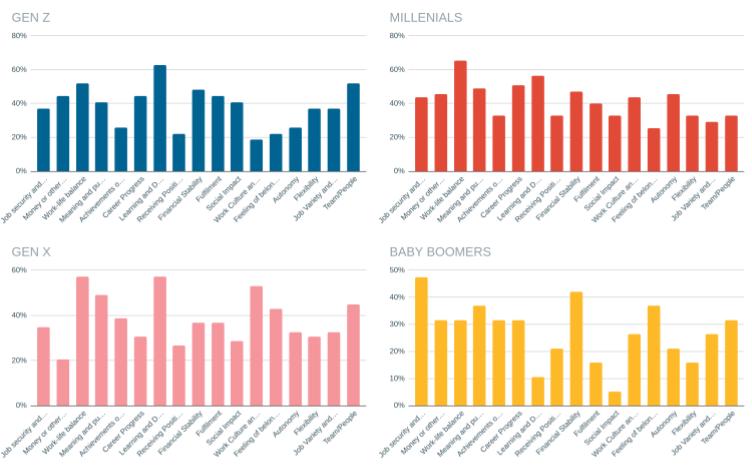29. What motivates you in the work environment? (You can choose more than one.)

This question aimed to bring out the main factors of professional motivation, leaving participants the opportunity to indicate several answers. The results, organised by generation, offer an interesting insight into how different age groups experience and seek satisfaction and stimulation in the work environment.
The proposed choices were: Job security and Stability, Money or other benefits, Work-life balance, Meaning and purpose, Achievements or recognition, Career Progress, Learning and Development, Receiving Positive Feedback, Financial Stability, Fulfilment, Social Impact, Work Culture and Environment, Feeling of belonging, Autonomy, Flexibility, Job Variety and Challenge, Team/People
For Generation Z, work motivation is mainly based on the possibility of continuous growth (Learning and Development) and on an environment conducive to work-life balance (Work-life balance). These young professionals value teamwork (Team/People), financial stability and opportunities for skills development, showing a strong propensity to seek meaning and flexibility rather than mere security or status.
Millennials tend to combine the search for financial security with the desire for a job that has meaning (Meaning and purpose) and allows them to feel recognised and appreciated (Achievements or recognition). They often attach importance to the corporate culture and the possibility of balancing personal and professional needs. For them, motivation comes from feeling part of a dynamic context that values autonomy, growth and social impact.
Generation X, often in a phase of professional consolidation, shows a motivation related to job security and stability and recognition of their achievements. However, aspects such as work-life balance and personal development also remain central, signalling a generation that, while aiming for security and career, does not give up quality of life and a sense of individual fulfilment.
Baby Boomers tend to value stability, financial security and recognition of individual contribution. Motivation for them is often linked to job continuity, a sense of belonging to a structured professional environment and a defined role. However, corporate culture and internal relationships can also play an important role, especially for those who remain professionally active out of passion and a sense of responsibility.
This post is also available in: German Italian Polish Portuguese (Portugal)







